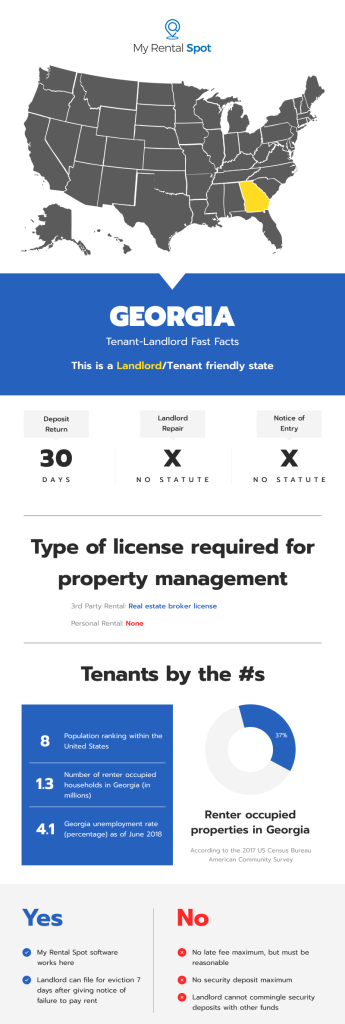Landlords and tenants will face legal issues during the rental process, but not every issue needs to involve the courts. This article will help you learn how the laws in your state handle everything from security deposits to termination notices so you can navigate these with ease.
This article is not intended to be exhaustive or a substitute for qualified legal advice. Laws and statutes are subject to change and may vary by county or city. You are responsible for performing your research and complying with all laws applicable to your unique situation.
If you have legal questions or concerns, we recommend consulting with the appropriate government agencies and a qualified lawyer in your area. Your state bar association may have a referral service to help you find a lawyer with experience in landlord-tenant law.
This article summarizes some key Georgia Landlord-Tenant laws applicable to residential rental units.

Official Rules, Regulations & Guides
- Georgia Code Ann. §§ 44-7 – Landlord and Tenant
- Georgia Community Affairs Landlord-Tenant Handbook (PDF)
- Georgia Landlord’s Guide to Section 8 Housing (PDF)
- Georgia Legal Aid Section 8 Housing Vouchers—Know Your Rights (PDF)
Security Deposit:
- Security Deposit Maximum: No Statute
- Deadline for Returning Security Deposit: 30 days. If the landlord is withholding or claiming part of the deposit due to damages, the landlord must provide a list of the damages and the amount withheld, within three days. (O.C.G.A §§ 44-7-33 and O.C.G.A. § 44-7-34)
- Allowable Deductions: The landlord is allowed to deduct from the security deposit: (O.C.G.A. § 44-7-34)
- Security Deposit Interest: The landlord does not have to place the deposit in an interest-bearing account nor does the landlord have to pay interest to the tenant. (handbook)
- Separate Security Deposit Bank Account: The landlord is required to place the security deposit in an escrow account in a banking institution regulated by federal financial laws. The landlord must notify the tenant in writing of the location of the escrow account. (O.C.G.A. § 44-7-31) This does not apply to owners and family members who collectively own ten or fewer rental units unless those units are managed by a third party for a fee. (O.C.G.A. § 44-7-36)
- Nonrefundable Fees: Allowed, but they must not be part of the security deposit. (O.C.G.A. § 44-7-30)
- Application Fees: Allowed (see handbook, pg.11).
- Pet Deposits and Additional Fees: Allowed (O.C.G.A. § 44-7-30)
- Require Written/Signed Move-In Checklist: If the owner and/or family members own ten or fewer rental units, the owner shall give the tenant a comprehensive list of any existing damage to the rental unit before the security deposit is collected. The tenant has the right to inspect the rental unit to confirm the accuracy of the list before moving in. (O.C.G.A. § 44-7-33). These requirements do not apply to owners and family members who collectively own ten or fewer rental units unless those units are managed by a third party for a fee. (O.C.G.A. § 44-7-36)
- Require Itemized List of Move-Out Damages and Charges: Within three business days after the tenant’s move-out date, the landlord shall inspect the rental unit and compile a comprehensive list of any damages, along with the estimated dollar value of such damage. This list is the basis for any withholding of the security deposit. The tenant then has the right to inspect the rental unit within five business days after the move-out date to ascertain the accuracy of the list. (O.C.G.A. § 44-7-33) This does not apply to owners and family members who collectively own ten or fewer rental units unless those units are managed by a third party for a fee. (O.C.G.A. § 44-7-36)
- Record Keeping of Deposit Withholdings: No Statute
- Failure to Comply: The landlord forfeits any right to withhold a deposit if the money was not originally deposited in an escrow account, or if the landlord did not provide move-in/move-out inspection lists. Any landlord who intentionally and wrongfully withholds a deposit may be liable for three times the amount withheld plus attorney’s fees. (O.C.G.A. § 44-7-35)
Lease, Rent & Fees:
- When Rent Is Due: No Statute
- Rent Increase Notice: No Statute
- Rent Grace Period: No Statute
- Late Fees: No Statute
- Prepaid Rent: No Statute
- No Limit on Rent Amount: No county or municipal corporation may enact or enforce any ordinance that regulates how much rent can be charged for privately owned, single-family, or multiple-unit residential rental properties. (O.C.G.A. § 44-7-19)
- Returned Check Fees: Yes, but the fee is not to exceed $30 or 5 percent of the check amount, whichever is greater, plus the amount of any fees charged to the check holder’s bank or financial institution. (O.C.G.A. § 13-6-15)
- Tenant Allowed to Withhold Rent for Failure to Provide Essential Services (Water, Heat, etc.): No Statute
- Tenant Allowed to Repair and Deduct Rent: No Statute
- Landlord Allowed to Recover Court and Attorney Fees: Yes (see handbook)
- Landlord Must Make a Reasonable Attempt to Mitigate Damages Caused by Lessee: Yes, but there is no statute that requires the Landlord to look for a new tenant. (O.C.G.A. § 44-7-34)
- Abandonment of Personal Property: The landlord can remove the tenant’s abandoned personal property with a formal writ of possession (i.e., a court order). (O.C.G.A. § 44-7-55)
- Termination of a Service Member:
- Specific Rules: A landlord must follow a specific process for terminating the lease of an active duty member of the regular or reserve component of the United States Armed Forces, the United States Coast Guard, the Georgia National Guard, or the Georgia Air National Guard on ordered federal duty for 90 days or longer. See O.C.G.A. § 44-7-22 for specific details.
- Limited Liability: Any liability of the Service Member for rent, as well as the cost of repairing damages to the rental unit, under the lease, may not exceed 30 days’ rent after written notice and proof of the assignment are given to the landlord. (O.C.G.A. § 44-7-37)
Notices & Entry:
- Notice to Terminate a Tenancy at Will (a Lease with No End Date): 60 days’ notice if the landlord is giving notice; 30 days if the tenant is giving notice. (O.C.G.A. § 44-7-7)
- Notice to Terminate Tenancy – Fixed End Date in Lease: No Statute. Typically no notice is needed as the lease simply expires.
- Notice to Terminate Tenancy – Month-to-Month Lease: 60 days’ notice if the landlord is giving notice; 30 days’ notice if the tenant is giving notice. (O.C.G.A. § 44-7-7)
- Notice to Terminate Tenancy – Week-to-Week Lease: No Statute
- Notice of Date/Time of Move-Out Inspection: No Statute
- Notice of Termination of All Leases for Nonpayment: Immediate lease termination. The landlord can also file for eviction immediately (O.C.G.A. § 44-7-50), however, the tenant has seven days to pay to avoid eviction. (O.C.G.A. § 44-7-52)
- Termination for Lease Violation: No Statute
- Required Notice before Entry: No Statute; 24 hours is recommended (see handbook, pg. 13)
- Entry Allowed with Notice for Maintenance and Repairs (nonemergency): Yes, but the landlord must provide prior notice; 24 hours is recommended. (see handbook, p. 13)
- Entry Allowed with Notice for Showings: Yes, but the landlord must provide prior notice – 24 hours is recommended (see handbook, p. 13)
- Emergency Entry Allowed without Notice: Yes (handbook, pg. 13)
- Entry Allowed During Tenant’s Extended Absence: No Statute
- Notice to Tenants for Pesticide Use: No Statute
- Lockouts Allowed: No (see handbook, pg. 55)
- Utility Shut-offs Allowed: No. Landlord is not allowed to discontinue heat, electricity, or water service. These actions are punishable by a fine not to exceed $500. (O.C.G.A. § 44-7-14.1)
Disclosures & Miscellaneous Notes:
- Special Tenant Rights & Restrictions: A tenant may not cut or destroy growing trees, remove permanent fixtures, or otherwise injure the property without prior permission. A tenant may use dead or fallen timber for firewood and pasturing cattle. (O.C.G.A. § 44-7-11)
- Landlord Responsibility & Liability:
- The landlord must keep the rental unit in repair. The landlord is liable for all substantial improvements made to the rental unit with their consent. (O.C.G.A. § 44-7-13)
- Having fully parted with possession and the right of possession, the landlord is not responsible for third parties damages resulting from the tenant’s negligent or illegal use of the rental unit. The landlord is responsible for damages caused by defective construction or the failure to keep the rental unit in repair. (O.C.G.A. § 44-7-14)
- Name and Addresses: At or before the commencement of a tenancy, and 30 days after any change, the landlord must provide the names and addresses of:
- The owner of the rental unit or a person authorized to act for and on behalf of that person; and
- The person authorized to manage the premises to the tenant. (O.C.G.A. § 44-7-3)
- Destruction of Dwelling: The destruction of a dwelling by fire or the loss of possession by any casualty not caused by the landlord does not release the tenant from the obligation to pay rent. (O.C.G.A. § 44-7-15)
- Flooding Disclosure: If any portion of the living space covered by the lease has flooded three times in the last five years, the landlord must disclose this to the applicant before signing a lease. (O.C.G.A. § 44-7-20)
- Lead Disclosure: Landlords must disclose all known lead paint hazards. Landlords must also provide tenants, as an attachment to a written lease, with an information pamphlet on lead-based paint hazards.
- Domestic Violence Situations: No Statute
- Retaliation: No Statute
Court & Legal Related:
- Georgia Small Claims Court Limits: $15,000 (O.C.G.A. § 15-10-2)
- Eviction Cases Allowed in Small Claims: Yes (source)
- Georgia Administrative Office of the Courts
- Georgia Small Claims Court (Magistrate Court)
- Georgia Attorney General
- State Bar of Georgia
- Georgia Local and Voluntary Bars
- GeorgiaLegalAid.org – Housing and Landlord-Tenant Information
- Low-Income Legal Aid:
- Atlanta Legal Aid Society – 404-524-5811
- Atlanta Volunteer Lawyers Foundation – 404-521-0790
- Georgia Senior Legal Hotline – 404-657-9915 or toll-free 1-888-257-9519
- Georgia Legal Services Program – 404-206-5175 or toll-free 1-800-498-9469
- Georgia Law Center for the Homeless – 404-681-068
Business Licenses:
- Business License Required: No state-wide statute, but local cities and counties may have regulations and requirements. Check with your local governing authority.
Helpful Links
Court & Legal Related:
- Atlanta Legal Aid Society, Inc. – Tenant’s Rights (PDF)
- Georgia Department of Law-Consumer Protection Unit Landlord Tenant Issues and Booklet
State Agencies & Regulatory Bodies
- U.S. Department of Housing and Urban Development – Georgia
- Georgia Real Estate Commission
- Georgia Insurance Division
- Georgia Governor’s Office of Consumer Protection
- Georgia Housing Search (Property Listing)
- Lead Paint Booklet (PDF)
- Lead Paint Disclosure (PDF)
Housing Authorities - Georgia Rental Assistance Program (Section 8 Housing)Realtor and Landlord/Tenant Associations
- Georgia Association of REALTORS®
- Middle Georgia Association of REALTORS®
- Atlanta Board of REALTORS®
- Greater Augusta Association of REALTORS®
- Columbus Board of REALTORS®
- Savannah Board of REALTORS®
- Georgia Apartment Association
- Atlanta Apartment Association
